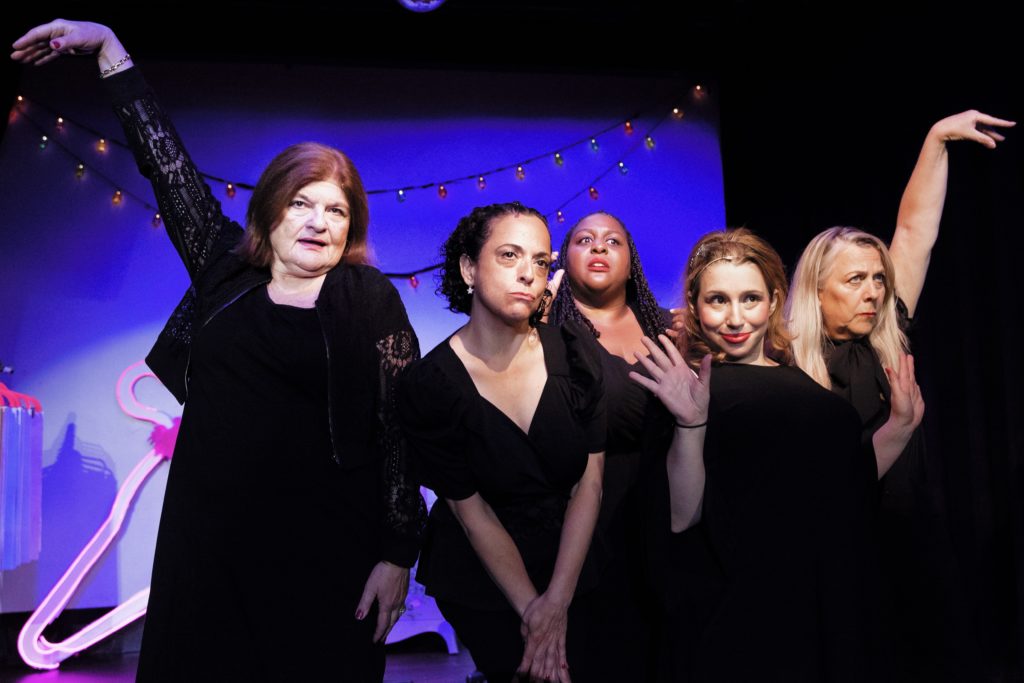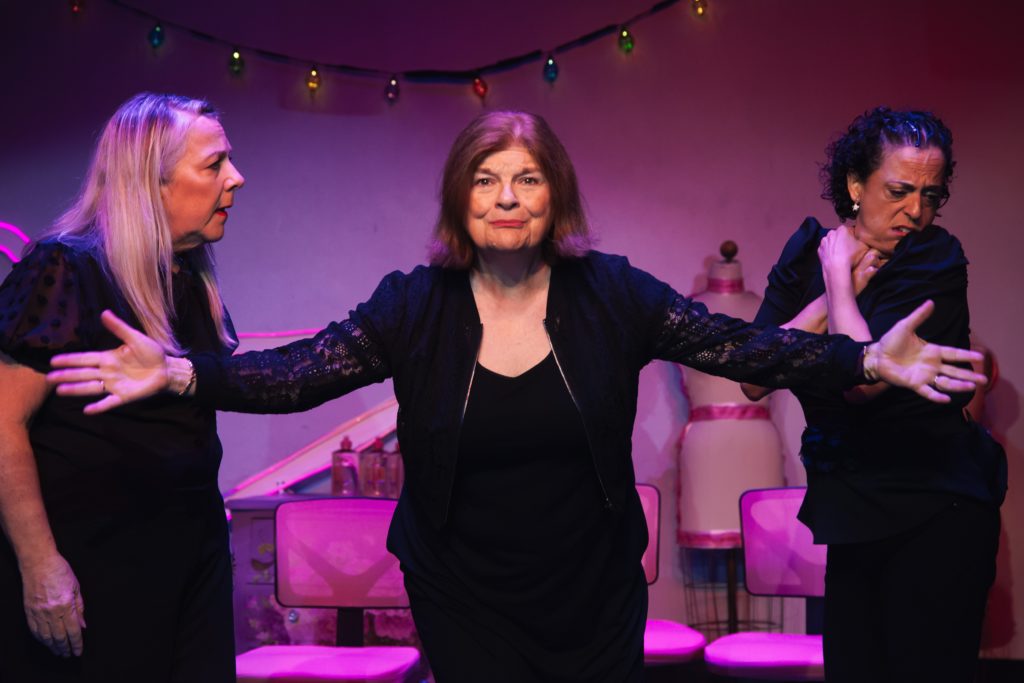
The cast looking gorgeous. Photo by Tim Gurczak.
Presented by Hub Theatre Company of Boston
By Nora Ephron and Delia Ephron
Based on the book by Ilene Beckerman
Directed by Paula Plum
Featuring: Nettie Chickering, Barbara Douglas, Lauren Elias, Evelyn Holley, June Kfoury
July 22 – August 5, 2023
Club Cafe
209 Columbus Ave
Boston MA
All tickets are Pay-What-You-Can.
Review by Kitty Drexel
BOSTON, Mass. — Hub Theatre Co. celebrates its ten-year anniversary with a production of Nora & Delia Ephron’s Love, Loss & What I Wore. Paula Plum and the cast made small updates to the original script to make it more tenable to new audiences. It runs at Club Cafe through August 5.
You’d be so pretty if. Clean Underpants. Your first bra. BLACK. I have nothing to wear. Purses. Humiliation. Betrayal. Joy. Celebration. Love, Loss & What I Wore is a collection of themes and stories told directly to the audience about the clothing we wore and the memories we accumulated. The clothing is the memory. The memories are us.
The ensemble Of Love, Loss & What I Wore (Nettie Chickering, Barbara Douglas, Lauren Elias, Evelyn Holley, and June Kfoury) give delightful performances. They share a fond camaraderie; they draw on each other’s strengths and appear genuinely happy to tell stories together. We want to listen to them because they listen to each other. We care for them because they care for each other. It’s a warm, welcoming production.
They work so well together that when the show’s writing verges into uncomfortably, artificially sweet intimacy, we forgive them. This production works best when director Paula Plum allows the cast to relax into their work. The group choreography is fun, but it doesn’t always flow naturally. The ensemble looks like they’ve been directed to pose and dance. The actors don’t look as if their characters are choosing to dance to celebrate a moment.
These moments of false intimacy are few. Largely, Love, Loss & What I Wore is good fun: we danced in our seats, we sang along to Madonna, and we teared up a little remembering good times and good clothes past (that no longer fit, dammit).
Justin Lahue’s set design features a large, neon pink coat hanger dead in the center of the stage. His design subversively draws the current political climate and our lack of comprehensive abortion healthcare to the forefront of the production: coat hangers are a useful tool for closet organization; they are also an emblem of the abortion movement. Look at the stage one way, it’s a fanciful set pinker than a vulva. Turn away and it’s a twee, harmless stage with saccharine pink water bottles and seat covers like a fancy lady’s dressing room.
Love, Loss & What I Wore appears to be a fluffy piece about women’s fashion trifles. It isn’t so. It is about the tribulations women suffer while wearing particular items. Memories and clothing are tied together until they are one.
In the 90s, it was easier to share our traumas if they were disguised with decorative pompoms and gilded ruffles. Women couldn’t appear too sincere lest we be slandered with the worst offense of that time: uppity, dramatic, sensitive, unprofessional. An Emotional Woman was the worst thing we could be.
The Ephrons discuss clothing because it’s harder to shut up a woman’s voice if you’re laughing with her. If women speak long enough maybe, they can convince men that working pockets are a feminist issue. Maybe one day those pockets will fit more than a tube of Revlon lipstick and a fiver.
The Ephrons’ classic play attacks the brutal, sometimes perverse relationship cis women have with their clothes. Whether it’s a shirt, a dress, BLACK, or a trench coat, our clothing is our shield against the world. Our choices reflect the contents of our minds. Clothing isn’t costuming; it’s camouflage.
Love, Loss & What I Wore examines a great many universal experiences, but the play depicts them with a cis-only lens. It was written before society began embracing non-binary identities across the gender spectrum.
Trans and non-binary people existed but Western society pretended they didn’t. The queer community was much more sheltered and justifiably afraid for their lives (we lost Matthew Shepard in 1998). Women had even less equity than we did two years ago. The 90s were a difficult time for gender and identity politics.
This play is a period piece now. Watching the play from this perspective may help anyone wrestling with the play’s outdated themes and statements.

Photo by Tim Gurczak.
The Ephrons broke the playwright glass ceiling with Love, Love and What I Wore. I urge anyone who sees this play and can only see its flaws to take another look. Look at how far we’ve come! Let’s go even further. Let’s get our right to comprehensive healthcare back!
All tickets to Love, Loss and What I Wore are Pay-What-You-Can (with a minimum of $1 online). It’s cheaper than seeing Barbie in theaters! Club Cafe, the venue, is right downtown and accessible by most MBTA lines. There is every reason for local artists to attend Hub’s production. Clear your schedule, grab your T pass and go.
Hub Theatre Company will accept donations of new and gently worn clothing at its performances. Please consider bringing some useful items to donate.
Donation isn’t the same as garbage collection; recipients deserve nice things, too. Donate something your mother or a stranger would be proud to wear.
Dear Cast and crew of Love, Loss & What I Wore,
I humbly apologize for the tardiness of this critique. I’ve been subjugated by health issues over the past week. They have prevented me from writing and posting.
I’m posting it now in the form intended for posting on July 31. Please excuse the typos.
Please know that it was never my intention to postpone my response. You deserve a swift and efficient critiquing process.
It remains a great privilege to serve my theatre community as a critic. I hold all of you in great respect and wish you an epically satisfying run of the show.
Best wishes and all the broken legs,
Kitty, Queen of the Theatre Geeks
